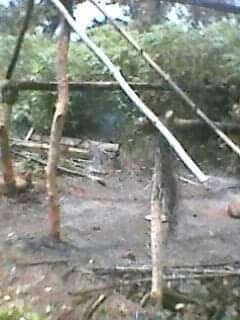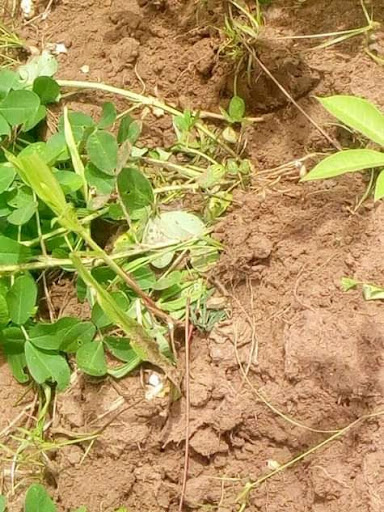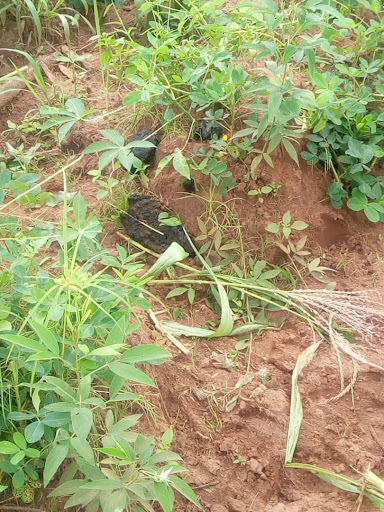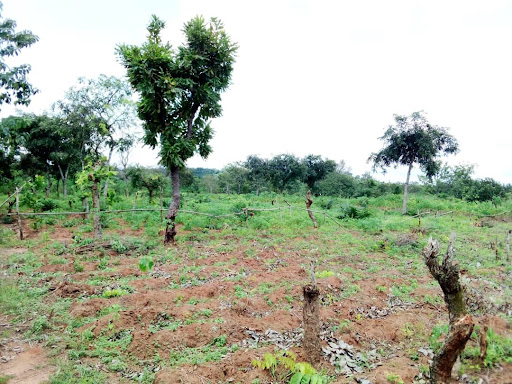Food Security Under Threat Over Activities Of Criminal Herders In Southeast Community
Activities of criminal herders in South-east Nigeria have thrown some farmers into huge debt and also threatened food security in the region.

Okey Emeka lost close to N3 million in June 2020 when criminal herders invaded his farm with their animals, at Ukpabi-Nimbo community, Uzo Uwani Local Government Area (LGA) in Enugu State, Southeast Nigeria.
Emeka had borrowed about N350,000 from a cooperative society, hoping to repay the loan as soon as he harvested and sold his crops, but lost everything in one fell swoop after the marauding cattle herders invaded his farm. It was his parents who came to his rescue and repaid the loan.

The setback did not discourage Emeka, a graduate of Business Administration and Management from the Institute of Management and Technology, Enugu. He continued farming with the hope to raise money to start a business.
Farming is the primary occupation of most residents of Uzo Uwani LGA of Enugu State. The local government, which has an area of 855 square metres and a population of 124,480 according to the 2006 census, is believed to be the food basket of the state.
Emeka and many in his age bracket in the Ukpabi-Nimbo community, see farming as the fastest route to raise money to pursue their dreams, whether in the field of academics or business.

However, the continuous destruction of their farms by criminal herders has been a threat to the attainment of their dreams.
“They destroyed more than 21 plots of land where I planted groundnut, cassava and yam,” Emeka narrates his experience in a shaken voice to HumAngle.
“They damaged everything. I couldn’t get anything from the farm,“ he said. “I borrowed money from a cooperative hoping that after selling my crops from the farm, I will be able to repay the loan.”
He, however, said that since the Eastern Security Network (ESN), the armed wing of the proscribed Indigenous People of Biafra (IPOB), began operation in the Southeast, the herders have left the community, but graze at night when people have gone to bed and leave to neighbouring state – Kogi, before daybreak.
Nnamdi Kanu, leader of IPOB, in Dec. 2020 launched ESN. According to him, the goal was to protect the old eastern region from herders’ rampage and other criminal elements.
Like Emeka, Igatta Arinze is still counting his losses. Arinze spent about N200,000 last year to plant palm trees which were destroyed by the herders.
An undergraduate of the Institute of Management and Technology, Enugu, studying Electrical Engineering, Arinze is supporting himself in school through his farming business.

“I planted palm trees there. Because the palm trees were very small, I heaped earth around each of them to grow. Knowing fully well that herders operate in our area, I used bamboo trees to fence the farm round. But the annoying thing is that they will come, use cutlass to cut off the bamboo trees and enter into the farm,” Arinze told HumAngle.
He said the criminal herders who are ready to confront anybody that tries to challenge them, again on Oct. 4 this year, visited his farm, destroying the crops there.
Frustrated by the current situation, he said that he does not know how else to protect his farm from herders grazing on it. He alleged that about four farmers were killed by herders early this year.
Dashed hopes, monumental losses
Okweli Gerald and his family have been having difficulty feeding. In August last year, their farm was the grazing field when the criminal herders brought their cattle. After losing the farm, the family can barely feed now. Gerrard planted cassava, maize, and tomatoes in his farm before that August visit by the herders.

He had spent close to N200,000 on cultivation, weeding, chemicals, and fertilizers. Gerald says he was hoping to have a bountiful harvest as the crops were already looking good, only to lose everything in one day following the invasion.
“The tomatoes had already grown big. The maize plants were already sprouting when the farm was destroyed. In fact, they leveled up everything as if nothing was planted hitherto,” the father of six told HumAngle.
Attacks on communities
In July, some armed gangs suspected to be criminal herders were reported to have attacked Obie-Aku, Opanda village, Nimbo community, killing four persons and injuring many others.
Before the attack, the herders had arrived in the community to graze in the farm settlement but were asked to leave because of the alleged destruction of crops in some farms. The following morning, around 3.00 am while the residents were still asleep, the village was attacked.
Confirming the attack, Daniel Ndukwe, the State’s Police Public Relations Officer, in a statement said the state’s Commissioner of Police had ordered an investigation into the incident.
“Following information received at the Nimbo Police Division in the early hours of today, July 26, 2021, alleging that yet-to-be-identified hoodlums attacked some persons in a location at Opanda village in Nimbo community of Uzo-Uwani LGA, police operatives attached to the division raced to the scene and found three young men with degrees of machete cuts. They were immediately rushed to a nearby hospital, where they are responding to treatment,” Ndukwe stated.
“Meanwhile, the area is calm, while the Commissioner of Police, Mohammed Aliyu, has ordered the conduct of thorough investigation to unravel the circumstances surrounding the incident and bring the perpetrators to book.”
A similar attack was also carried out by suspected criminal herders in April, 2016. About 46 persons were killed at the same Nimbo.
The attack took place barely 24 hours after rumour that no fewer than 500 heavily-armed gangs suspected to be criminal herders had sneaked into the community with the intention to launch an attack. The terror attack hit seven villages in Nimbo, namely, Nimbo Ngwoko, Ugwuijoro, Ekwuru, Ebor, Enugu Nimbo, Umuome, and Ugwuachara.
Senate decries attacks
Following a motion moved by Chukwuka Utazi, the senator representing Enugu North Senatorial District at the National Assembly titled, “The existential threat to the people of Uzo-Uwani LGA of Enugu State”, the Senate had in May 2019, charged the Nigerian Government to restrict movement of cattle in the country as a strategy to checkmate criminals who disguise as herders to perpetrate evil.
The Upper Chamber called on the country’s security agencies to tackle criminal activities of some suspected herders, who had taken over farms in Uzo-Uwani LGA, while urging the people of the local government to maintain peace.
The Senate action was taken in reaction to the killing of one Dr Nnamdi Ogueche, by suspected criminal herders in the local government. According to Utazi, late Ogueche was killed for condemning the violent take-over of farmlands in the local government.
In July, Utazi also condemned the attack on the Opanda-Nimbo migrant farmers from Aku in Igbo Etiti LGA of Enugu State, and called on the state House of Assembly to pass anti-open grazing bill into law in the state, to prevent any future herder-farmer clashes. The incessant destruction of farms by herders has created fear among farmers. Utazi warned that it could affect the harvest.
Enugu governor signs anti-open grazing bill into law
Ifeanyi Ugwuanyi, Governor of Enugu State in Sept. signed the state’s anti-open grazing bill into law. The bill entitled, “Prohibition of Open Grazing and Cattle Ranching Law of Enugu State” was signed into law following its passage by the state House of Assembly on Sept. 2 after a public hearing.
In response to public outcry over the activities of armed herders in several communities, the Nigerian Southern Governors’ Forum at its meeting in Lagos State, had set a September deadline for the ban on open grazing in the region.
At its meeting last month, which was held in Enugu, the forum in a communique “expressed satisfaction with the rate at which the states in Southern Nigeria are enacting or amending the Anti- Open Grazing Laws which align with the uniform template and aspiration of Southern Governors and encouraged the states that are yet to enact this law to do so expeditiously”.
It encouraged the full operationalisation of already agreed regional security outfits, which it said “would meet, share intelligence and collaborate, to ensure the security and safety of the region.”
In response to the 2016 Nimbo massacre, the Enugu State government approved N100 million for equipping the local security outfit, Neighbourhood Watch, for effective policing of rural communities in the state.
In October of the same year, the state government recruited thousands of young men into the Neighbourhood Watch. Members of the security outfit serve each of the 470 communities in the state.
In spite of the presence of Neighbourhood Watch in various communities across the state, the invasion of farms by criminal herders in Uzo Uwani persists, leaving farmers in the local government helpless and hapless.
As the criminal herders continue to invade farms with little or no resistance from state security agencies like the police and the army, the dreams of so many young farmers in Uzo Uwani hang in the balance.
Support Our Journalism
There are millions of ordinary people affected by conflict in Africa whose stories are missing in the mainstream media. HumAngle is determined to tell those challenging and under-reported stories, hoping that the people impacted by these conflicts will find the safety and security they deserve.
To ensure that we continue to provide public service coverage, we have a small favour to ask you. We want you to be part of our journalistic endeavour by contributing a token to us.
Your donation will further promote a robust, free, and independent media.
Donate HereStay Closer To The Stories That Matter




